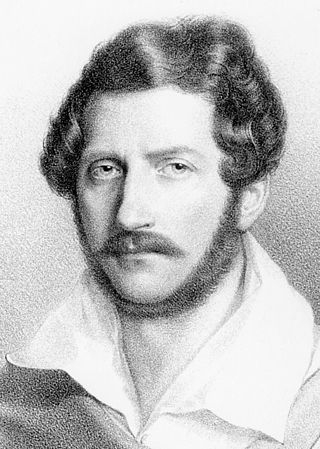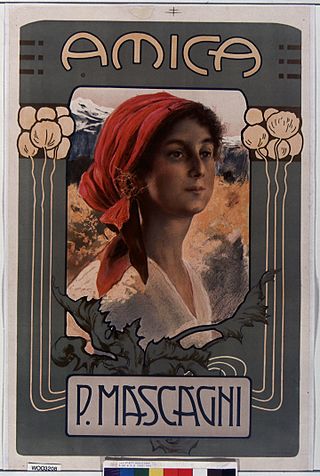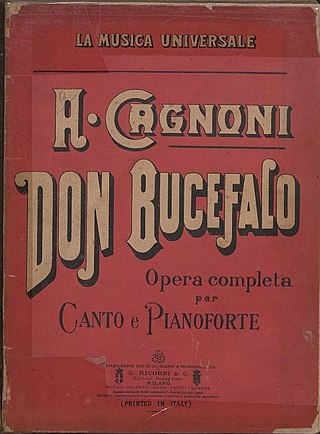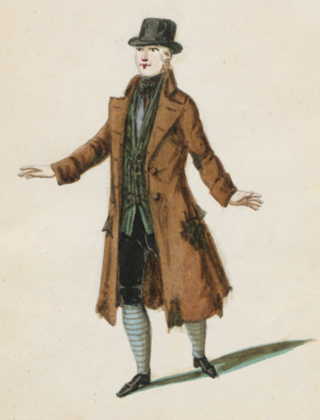
L'esule di Roma, ossia Il proscritto is a melodramma eroico, or heroic opera, in two acts by Gaetano Donizetti. Domenico Gilardoni wrote the Italian libretto after Luigi Marchionni's Il proscritto romano, in its turn based on Louis-Charles Caigniez and Debotière's Androclès ou Le lion reconnaissant. It premiered on 1 January 1828 at the Teatro San Carlo, Naples.

Il Pigmalione (Pygmalion) is a scena lirica in one act by Gaetano Donizetti. The librettist is unknown, but it is known that the libretto was based on one by Antonio Simeone Sografi for Giovanni Battista Cimador's Pimmalione (1790), in turn based on Jean-Jacques Rousseau's Pygmalion and ultimately based on Book X of Ovid's Metamorphoses. Sografi's libretto was also used for an opera by Bonifacio Asioli (1796).

Gianni di Parigi is an 1839 melodramma comico in two acts with music by Gaetano Donizetti to a libretto by Felice Romani, which had previously been set by Francesco Morlacchi in 1818 and by Giovanni Antonio Speranza in 1836.

Il falegname di Livonia, o Pietro il grande, czar delle Russie is an 1819 opera buffa in two acts with music by Gaetano Donizetti set to a libretto by Gherardo Bevilacqua-Aldobrandini. The libretto was based in part on Felice Romani's libretto for Giovanni Pacini's opera Il falegname di Livonia, which had just been presented at La Scala in Milan on 12 April 1819. Another source was Alexandre Duval's comedy Le menuisier de Livonie, ou Les illustres voyageurs (1805).

La zingara is an opera semiseria in two acts by Gaetano Donizetti, set to a libretto by Andrea Leone Tottola after La petite bohémienne by Louis-Charles Caigniez, which was itself derived from a work of August von Kotzebue.

Alfredo il grande is a melodramma serio or serious opera in two acts by Gaetano Donizetti. Andrea Leone Tottola wrote the Italian libretto, which may have been derived from Johann Simon Mayr's 1818 opera of the same name. The opera tells the story of the Anglo-Saxon king Alfred the Great.

Adelaide di Borgogna, ossia Ottone, re d'Italia is a two-act opera composed by Gioachino Rossini to a libretto by Giovanni Schmidt. It was premièred at the Teatro Argentina in Rome on 27 December 1817.

Amica is an opera in two acts by Pietro Mascagni, originally composed to a libretto by Paul Bérel. The only opera by Mascagni with a French libretto, it was an immediate success with both the audience and the critics on its opening night at the Théâtre du Casino in Monte-Carlo on 16 March 1905. Mascagni himself conducted the performance. The opera had its Italian premiere on 13 May 1905 at the Teatro Costanzi in Rome.

L’occasione fa il ladro, ossia Il cambio della valigia is an opera in one act by Gioachino Rossini to an Italian libretto by Luigi Prividali, based on Le prétendu par hasard, ou L’occasion fait le larron, an 1810 vaudeville by Eugène Scribe.

Torvaldo e Dorliska is an operatic dramma semiserio in two acts by Gioachino Rossini to an Italian libretto by Cesare Sterbini, based on the novel/memoir Les Amours du chevalier de Faublas (1787–1790) by the revolutionary Jean-Baptiste Louvet de Couvrai, whose work was the source of the Lodoïska libretto set by Luigi Cherubini (1791), and Lodoiska set by Stephen Storace (1794), and Simon Mayr (1796).

Il re is a novella or opera in one act and three scenes by composer Umberto Giordano to an Italian libretto by Giovacchino Forzano. The opera premiered at La Scala in Milan on 12 January 1929.
Giuseppe Fioravanti was an Italian opera singer active during the first half of the 19th century. Although one of the most important and popular basso buffos of his generation, there is only a relatively small amount of information available about his life. He had a highly fruitful partnership with the Teatro Nuovo in Naples and is best known today for creating roles in the world premieres of numerous operas by Gaetano Donizetti.

Don Gregorio is an 1826 opera by Gaetano Donizetti from a libretto by Jacopo Ferretti and adapted from his popular 1824 opera buffa L'ajo nell'imbarazzo, which had enjoyed considerable success when presented at the Teatro Valle in Rome on 4 February 1824.

Antonio Cagnoni was an Italian composer. Primarily known for his twenty operas, his work is characterized by his use of leitmotifs and moderately dissonant harmonies. In addition to writing music for the stage, he composed a modest amount of sacred music, most notably a Requiem in 1888. He also contributed the third movement, Quid sum miser, to the Messa per Rossini, a collaborative work created by thirteen composers to honor Gioacchino Rossini.

Il furioso all'isola di San Domingo(The Madman on the Island of San Domingo) is a "romantic melodramma" in two acts by the composer Gaetano Donizetti. Jacopo Ferretti, who since 1821 had written five libretti for Donizetti and two for Rossini, had proposed the unusual subject and he was contracted to write the Italian libretto based on a five-act play of the same title by an unknown author in 1820, which "had been given in the same theatre [...] and which Donizetti had immediately loved". However, as has been noted by Charles Osborne, the "ultimate derivation of both play and libretto is an episode in part 1 of Don Quixote by Miguel de Cervantes's published in 1605" which is the story of Cardenio and Lucinda.

Don Bucefalo is an opera in three acts composed by Antonio Cagnoni to a libretto by Calisto Bassi. Bassi's libretto was based on the libretto by Giuseppe Palomba to Le cantatrici villane (1799) by Valentino Fioravanti. Don Bucefalo premiered on 28 June 1847 at the Milan Conservatory.

Nicola De Giosa was an Italian composer and conductor active in Naples. He composed numerous operas, the most successful of which, Don Checco and Napoli di carnevale, were in the Neapolitan opera buffa genre. His other works included sacred music and art songs. His songs were particularly popular, bringing him fame as a salon composer both in Italy and abroad. De Giosa died in Bari, the city of his birth, at the age of 66.

Don Checco is an opera in two acts composed by Nicola De Giosa to a libretto by Almerindo Spadetta. It premiered on 11 July 1850 at the Teatro Nuovo in Naples. Don Checco was De Giosa's masterpiece and one of the last great successes in the history of Neapolitan opera buffa.
Pio Botticelli was an Italian bass-baritone active in the opera houses of Italy from 1810 until the mid-1840s. Amongst the numerous roles he created in world premieres were Pietro il Grande in Donizetti's Il falegname di Livonia and The Caliph in Pacini's La schiava in Bagdad. He also sang the role of Leucippo in the Austrian premiere of Rossini's Zelmira.
Savino Monelli was an Italian tenor prominent in the opera houses of Italy from 1806 until 1830. Amongst the numerous roles he created in world premieres were Giannetto in Rossini's La gazza ladra, Enrico in Donizetti's L'ajo nell'imbarazzo and Nadir in Pacini's La schiava in Bagdad. He was born in Fermo where he initially studied music. After leaving the stage, he retired to Fermo and died there five years later at the age of 52.











